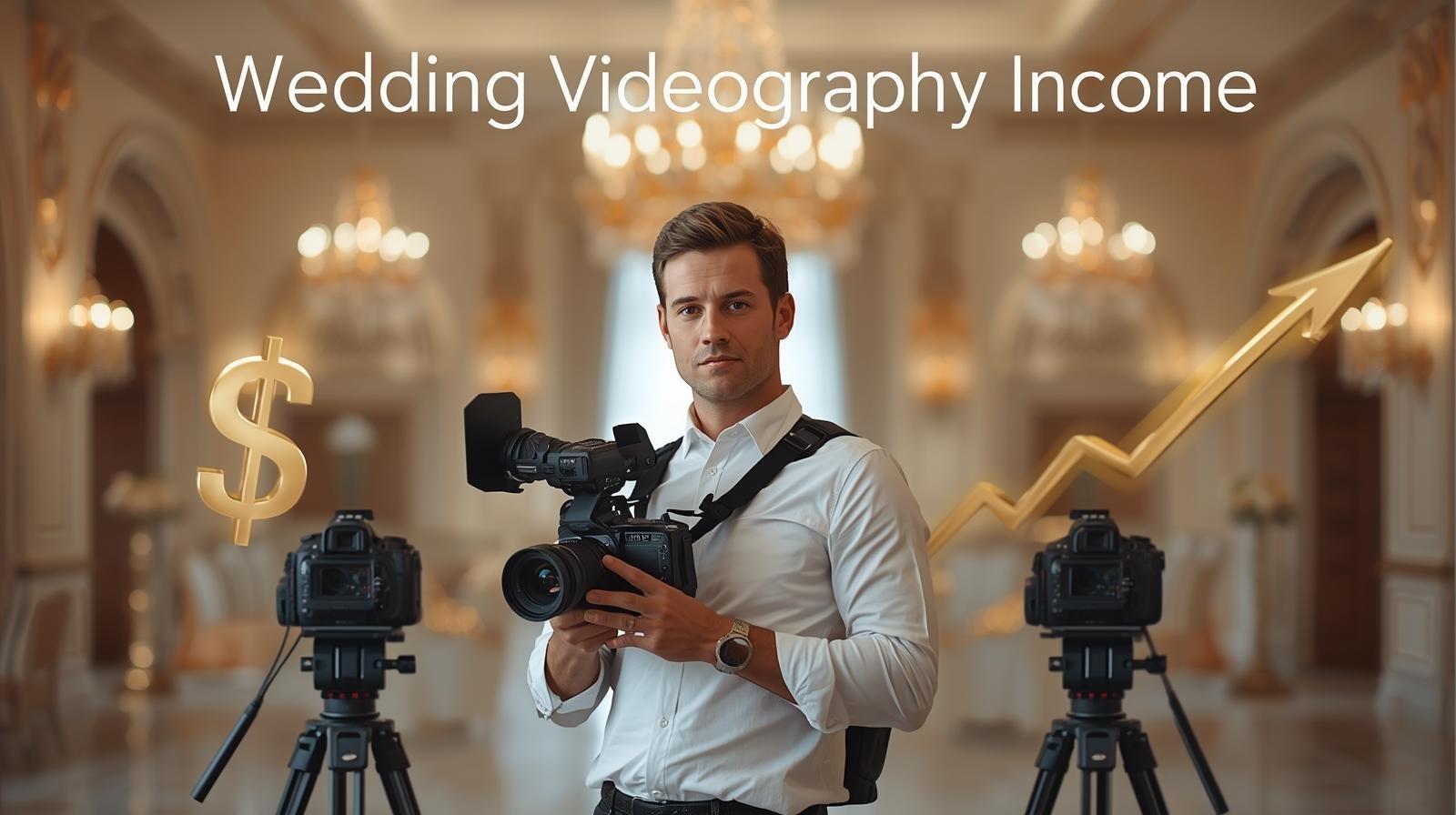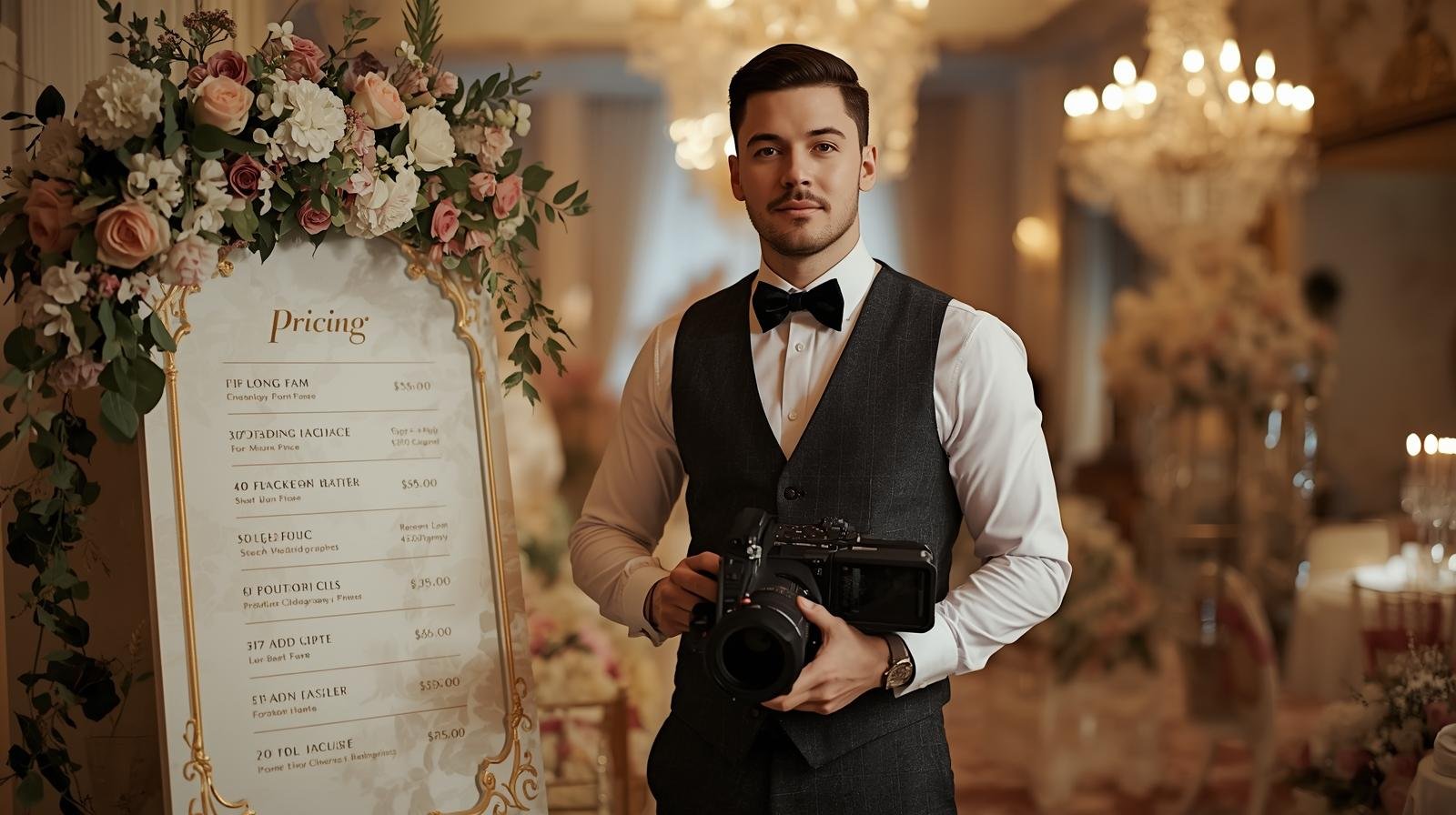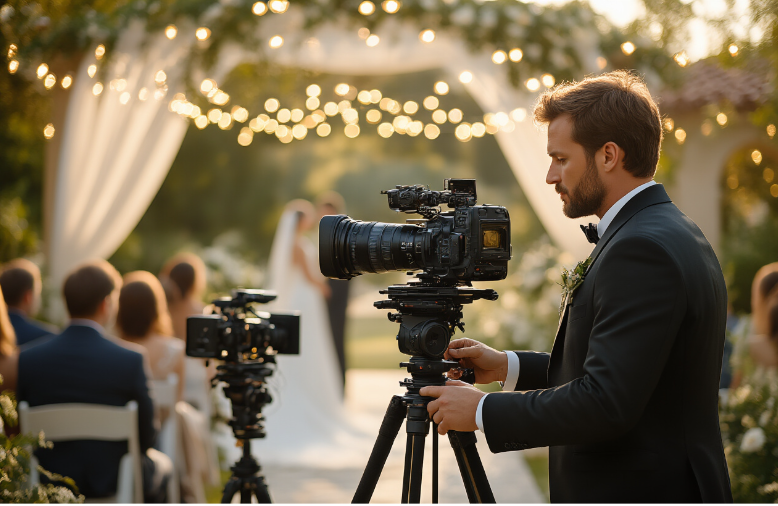Do wedding videographers make good money?
Summary
Depending on their location, level of experience, and business management, wedding videographers can make anywhere from $30,000 to over $100,000 annually. Offering top-notch storytelling, having multiple revenue sources, and approaching videography as a professional brand rather than merely a creative ability are all key components of success.
Filmmakers can turn every project into a long-term business opportunity by using platforms like MediaZilla to present their work professionally, monetize their work, and deliver videos securely.
Introduction
Depending on their level of expertise, business plan, and level of skill, wedding videographers can make anywhere from $30,000 to six figures annually.
This guide outlines the true income of videographers, the factors that affect it, and strategies for boosting profits through more intelligent pricing, marketing, and sources of income other than wedding day filming.
How Do Wedding Videography Prices Vary by Package and Location?
Average pricing for different package tiers
Wedding videography packages generally fall into three main levels based on service and quality.
- Basic packages ($1,200–$2,500) offer single-camera coverage and a short highlight reel for budget-conscious couples.
- Mid-tier packages ($2,500–$5,000) include dual cameras, longer highlight films, ceremony footage, and added elements like drone shots or vow audio.
- Premium packages ($5,000–$15,000+) deliver cinematic storytelling with full-day coverage, multiple cameras, and advanced post-production.
Regional Variations in Wedding Videography Rates
Location greatly affects what couples pay for videography.
- Big cities like New York, Los Angeles, and San Francisco charge 40–60 % higher than average, with mid-tier packages costing $4,000–$8,000.
- Smaller cities and rural areas offer $1,000–$3,500 packages but often face fewer weddings and limited demand.
- Destination hotspots such as Napa Valley, Charleston, and the Hamptons command premium pricing due to affluent clients.
- Local economy and cost of living strongly influence pricing power.
- Smart videographers adjust rates based on regional demand instead of national averages.
Premium vs budget market positioning
There are three segments in the wedding videography market: budget, mid-tier, and premium. Budget videographers emphasize low costs, basic equipment, and simple editing. High end gear, artistic presentation, and cinematic storytelling are the main focuses of premium videographers.
Mid-tier experts strike a balance between cost and quality, catering to the largest clientele while preserving consistent profit margins through venue or style specialization.
Seasonal Pricing Fluctuations
The revenue from wedding videography changes with the season, as demand and pricing shift throughout the year.
- Peak season (May–October): Videographers can charge 15%–25% more due to high demand, especially for Saturday weddings.
- Off-season (January–March): Lower demand often leads to 10%–20% discounts to attract clients.
- Special occasions like Valentine's Day or New Year's Eve bring premium pricing regardless of season.
- Successful videographers adjust pricing around seasonal demand and use slower months for editing, marketing, and equipment maintenance.
What Determines a Wedding Videographer’s Earning Potential?
Experience Level and Portfolio Quality
Your earning potential as a wedding videographer directly correlates with the quality of your work and years in the business. Newcomers typically charge $800-1,500 per wedding, while seasoned professionals with impressive portfolios command $3,000-8,000 or more. The difference lies in storytelling ability, technical precision, and the trust clients place in experienced professionals.
Building a standout portfolio requires shooting diverse weddings and showcasing different styles. Couples pay premium rates for videographers who demonstrate consistency, creativity, and the ability to capture emotional moments authentically. Award-winning work or features in wedding publications significantly boost earning power.
Geographic Location and Local Market Demand
- Location strongly impacts earnings big cities bring higher pay, smaller towns lower.
- Major metropolitan areas like New York, Los Angeles, and San Francisco typically pay $4,000–$10,000 per wedding.
- Smaller markets often offer $1,200–$3,000 for similar services.
- Luxury destinations such as Napa Valley, Martha’s Vineyard, and the Hamptons allow premium pricing due to affluent clients and higher living costs.
- Rural areas generally mean lower rates but also less competition and reduced expenses.
Equipment Investment and Technical Capabilities
Your gear directly impacts earning potential and service quality. Professional-grade cameras, stabilizers, drones, and audio equipment cost $15,000-50,000 initially but enable higher pricing tiers. Clients paying $5,000+ expect crisp 4K footage, smooth cinematic movements, and crystal-clear audio.
Advanced technical skills like color grading, multicamera editing, and drone cinematography justify premium rates. Videographers offering same-day highlight reels, live streaming, or virtual reality experiences can charge additional fees. Equipment maintenance, insurance, and regular upgrades require ongoing investment but maintain a competitive edge.
Marketing Effectiveness and Client Acquisition Skills
Successful wedding videographers excel at marketing themselves across multiple channels. A strong presence on social media platforms like Instagram and TikTok helps showcase their work to engaged couples who are actively planning weddings. Professional websites with effective SEO optimization capture local searches and convert visitors into clients.
Referral networks with wedding planners, photographers, and venues generate consistent bookings. Many top earners receive 60–80% of their business through referrals, reducing advertising costs while allowing them to charge higher rates. Client testimonials, vendor relationships, and industry awards build credibility that supports premium pricing and long-term success.
Specialization in Luxury or Destination Weddings
Revenue can be significantly increased by focusing on luxury or destination weddings. Luxury videographers serve affluent clients who demand professionalism and cinematic storytelling, earning them between $8,000 and $20,000.
For multi-day events, destination specialists charge premium rates plus travel expenses while traveling the world. High-paying jobs are available in well-known markets like the Caribbean, Bali, and Tuscany. Establishing relationships with venues and luxury planners is essential to breaking into this lucrative market.
How Can Wedding Videographers Earn More Beyond Basic Coverage?
Engagement Session and Pre-Wedding Content
Pre-wedding and engagement photos are excellent methods to boost yearly revenue and foster customer confidence:
- Engagement sessions, which include romantic short films for social media or save-the-date videos, range in price from $500 to $1,500.
- Pre-wedding activities that generate additional revenue include bachelor party coverage, rehearsal dinners, and trailers.
- In addition to offering a creative, stress-free setting, these sessions frequently encourage couples to later reserve expensive wedding packages.
Raw Footage and Highlight Reel Upsells
Offering extended highlight reels and raw footage for sale is a simple and low-effort way to increase revenue.
- Raw footage, which includes uncut speeches, ceremonies, and candid moments, can fetch between $200 and $800.
- Upgrades to highlight reels last anywhere from three to fifteen minutes, and social media edits cost between $150 and $400.
- To increase sales, provide family versions with extra moments or expedited delivery (1 week) for premium rates.
Anniversary Video Services for Past Clients
Building long-term relationships with past clients creates recurring revenue that many videographers overlook. Anniversary videos using original wedding footage combined with new interviews or current family photos generate steady income years after the initial wedding. These projects typically price between $300 and $1,200 depending on complexity.
First-year anniversary videos prove especially popular as couples reflect on their wedding day while sharing new memories from their first year of marriage. Five and ten-year anniversary videos offer opportunities for more elaborate productions, potentially incorporating children, new homes, or significant life changes.
Maintaining an organized client database with anniversary dates enables proactive marketing of these services. Simple email campaigns or social media posts around anniversary seasons can generate surprising response rates. Past clients already trust your work and understand your pricing structure, making them easier conversions than new prospects.
Corporate Event and Commercial Videography
By using their abilities on business and corporate projects, wedding videographers can increase their income:
- With less creative pressure, corporate work (events, launches, retreats) pays $1,500 to $4,000 per day.
- Continuous videos are required by commercial clients for social media, training, and marketing in order to generate consistent revenue.
- Business networking frequently results in wedding recommendations, which makes it an excellent way to diversify income all year long.
How Do Business Expenses Affect a Wedding Videographer’s Actual Earnings?
Professional camera equipment and maintenance costs
- Cameras range from $2,000 to $8,000 each, and the majority use several bodies to capture various angles.
- Lenses: for different focal lengths, $1,000 to $3,000 each.
- Accessories include lighting ($1,000+), audio equipment ($500–$2,000), and drones ($1,500–$3,000).
- Maintenance: To remain competitive, professionals set aside 15% to 20% of their annual budget for cleaning, repairs, and upgrades every three to four years.
Software licensing and editing technology
Video editing demands powerful computers and specialized software that come with hefty price tags. Adobe Creative Suite subscriptions run $240 annually, while Final Cut Pro costs $300 upfront. Professional color grading software like DaVinci Resolve Studio adds another $295.
The computer itself becomes a major investment. Video editing requires high-end processors, substantial RAM (32 GB minimum), and fast storage drives. A capable editing workstation costs $3,000 to $6,000, with many professionals maintaining backup systems. External storage drives for archiving wedding footage can add $500 to $1,000 yearly.
Cloud storage for client delivery and backup services creates ongoing monthly expenses. Platforms like Mediazilla or Frame.io charge $20 to $50 monthly, depending on storage needs and client requirements.
Marketing and advertising investment
Growing a wedding videography business requires consistent marketing across a variety of platforms.
- Website & SEO: $500–$2,000 per year for design and hosting, plus $500–$2,000 per month for SEO in markets with high competition.
- Social media ads: $200 to $800 per month for visibility on Facebook and Instagram.
- Wedding Shows: $300 to $1,500 per event, plus $500 to $1,000 for setup.
- Print and Portfolio Supplies: $300 to $800 per year for branding, albums, and cards.
- Styled Shoots & Networking: $500–$2,000 per shoot, and $1,000–$3,000 per year for workshops and events to stay current and generate referrals.
How Can Wedding Videographers Maximize Their Income?
Building Long-Term Client Relationships for Referrals
Successful videographers know that referrals bring in more weddings than ads. So, treat each wedding as an opportunity for future bookings. Sending a sneak peek within 48 hours gets couples excited to share online, and surprise extras, behind-the-scenes clips, or Instagram-friendly highlights make your delivery memorable. Keep relationships active by touching base after the wedding with anniversary messages, reminders of the video, or casual calls. A no-brainer referral system utilizing discounts or small gifts incentivizes clients to refer others. Building trust and lasting connections depends on remembering family details or certain customer preferences.
Creating Multiple Revenue Streams Within Each Project
Every wedding has a number of add-on opportunities for increased income. Engagement shoots, with a value of $500 to $1,500, are easy to upsell and help build rapport before the big day. Selling raw footage for $200-$800 or offering same-day highlight edits for $800-$2,000 adds extra profit with minimal effort. Other upsells include drone footage, social media trailers, or mini family videos to raise overall package value. By presenting all of these during the consultation, it feels like you're offering personalized upgrades rather than a sales pitch. One wedding turns into several streams of revenue.
Developing Efficient Workflow Systems to Handle More Bookings
Streamlining workflow directly affects income by saving time and increasing capacity. Standardizing equipment setup, using checklists, and batching similar editing tasks will reduce stress and improve speed. Upgrading to faster computers and software can cut editing time in half. Automated templates for client communication, contracts, and delivery keep projects organized. Tools like project trackers or CRMs help you manage multiple weddings efficiently. In the high season, second shooters or editors will guarantee consistency and quality and give you the ability to book more, which is directly related to higher yearly revenue.
Conclusion
Wedding videography can definitely be a profitable career path when you understand the business side of things. Most videographers earn between $1,500 and $5,000 per wedding, but your actual take-home depends on smart pricing, managing your costs, and finding ways to make money beyond just the wedding day itself. The videographers who really succeed are the ones who offer extra services like engagement shoots, day-after sessions, and premium editing packages while keeping their business expenses under control.
Your earning potential comes down to positioning yourself correctly in the market and treating this like a real business, not just a creative hobby. Focus on building strong relationships with venues and wedding planners, invest in quality equipment that lasts, and don't be afraid to raise your prices as you gain experience. The couples getting married today value video more than ever before, so there's definitely money to be made if you're willing to put in the work and run your videography business smartly.







